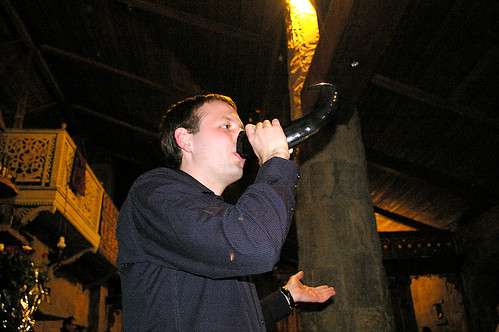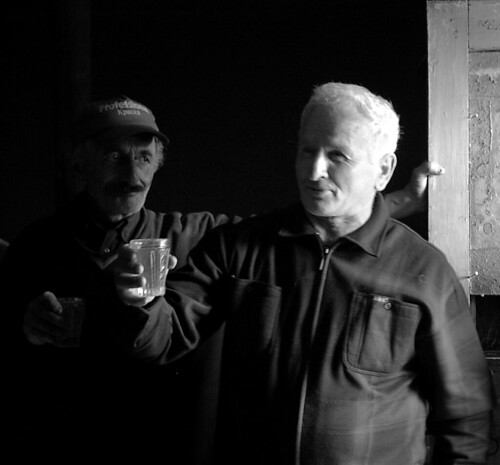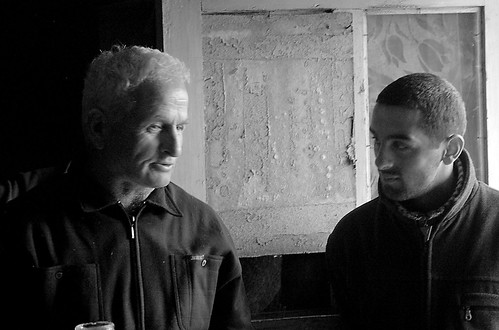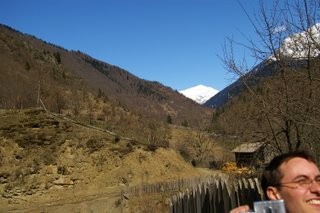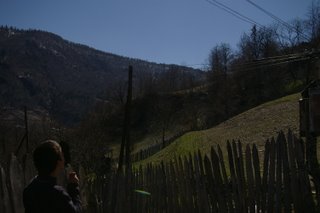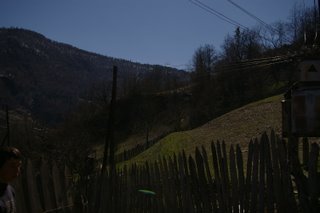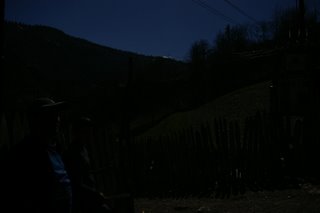Hell No, More Merlot
I used to get the feeling that students at my old alma mater, UT-Austin, had an inferiority complex when it came to protesting. This was in those days after Clinton but before Iraq, when everyone was pretty sure there would be something to rage about, but until then, the labor practices of our dining hall caterers would have to suffice for exercising the ol' dissenting muscle. Hey hey, Chick-fil-a, how many health insurance benefits did you cut today? These students knew what a hotbed of radicalism UT had been during Vietnam, and you got the idea, as you tip-toed over the prone black-clad bodies at the Die-In protesting the absence of an Asian American Studies program, that these kids would have given their last hackey sack for a good, morally repugnant war to go berzerk over. Hope they're enjoying themselves nowadays.
Am I too young for misty university nostalgia? I hope not. I met a few travelers last night that were passing through Georgia. They were university students riding bikes from Turkey to Mongolia, and they had long scraggly beards and I bet they didn't care much for authority structures, and they said that America was set up from the beginning to serve the interests of a bunch of fuckin' rich white dudes. Honestly: fuckin' rich white dudes. I was exactly back at the 21st street co-op, and it made me want to hug them. I also kind of wanted to check out their calf muscles (Turkey to Mongolia??) but I refrained.
I'm being glib, but there's a point here. I've learned a lot since those days, and one thing is that we went about protesting all wrong.
The thing to do, see, is to just have dinner and drink a lot. As previously mentioned, that was the nature of our "protest" across from the Russian Embassy, and I can assure you it was far more pleasant than, say, Kent State.
 I guess we didn't really have permission, so to speak, to set up a dinner party on the sidewalk across from the Russian Embassy. (Underplayed hilarious aspect of this: the sidewalk across the street from the Russian Embassy is the sidewalk of the Iranian Embassy. Where they, you know, really love the wine.) So when a local cop sidled up to our table, it was sort of like college again. Jesus, the fuzz is here, party's over. (At least now I don't have to chuck the booze and crawl under a fence to get off the property and avoid the dreaded M.I.P.)
I guess we didn't really have permission, so to speak, to set up a dinner party on the sidewalk across from the Russian Embassy. (Underplayed hilarious aspect of this: the sidewalk across the street from the Russian Embassy is the sidewalk of the Iranian Embassy. Where they, you know, really love the wine.) So when a local cop sidled up to our table, it was sort of like college again. Jesus, the fuzz is here, party's over. (At least now I don't have to chuck the booze and crawl under a fence to get off the property and avoid the dreaded M.I.P.)
But here's why I love this country. The cop just said, "No, no, there's no problem. I don't care. I'm just curious what you guys are doing out here." When we explained that we were showing our disagreement with the Russian ban on Georgian wine by partaking under their diplomatic noses, well, what else could he do? He grabbed a glass of wine and offered a toast; he thanked us for what we were doing and said that it was very important for Georgia. And then, most amazing of all, he handed the wine back to us because he was working and could not be drinking. It really is a new Georgia.
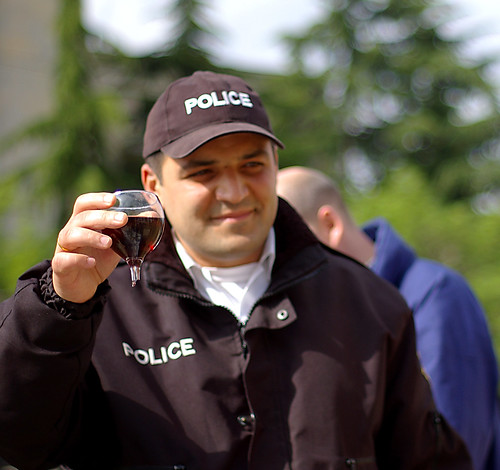
UPDATE: Not to beat a dead horse, but another fine photo collection from the event can be found here.
Am I too young for misty university nostalgia? I hope not. I met a few travelers last night that were passing through Georgia. They were university students riding bikes from Turkey to Mongolia, and they had long scraggly beards and I bet they didn't care much for authority structures, and they said that America was set up from the beginning to serve the interests of a bunch of fuckin' rich white dudes. Honestly: fuckin' rich white dudes. I was exactly back at the 21st street co-op, and it made me want to hug them. I also kind of wanted to check out their calf muscles (Turkey to Mongolia??) but I refrained.
I'm being glib, but there's a point here. I've learned a lot since those days, and one thing is that we went about protesting all wrong.
The thing to do, see, is to just have dinner and drink a lot. As previously mentioned, that was the nature of our "protest" across from the Russian Embassy, and I can assure you it was far more pleasant than, say, Kent State.
 I guess we didn't really have permission, so to speak, to set up a dinner party on the sidewalk across from the Russian Embassy. (Underplayed hilarious aspect of this: the sidewalk across the street from the Russian Embassy is the sidewalk of the Iranian Embassy. Where they, you know, really love the wine.) So when a local cop sidled up to our table, it was sort of like college again. Jesus, the fuzz is here, party's over. (At least now I don't have to chuck the booze and crawl under a fence to get off the property and avoid the dreaded M.I.P.)
I guess we didn't really have permission, so to speak, to set up a dinner party on the sidewalk across from the Russian Embassy. (Underplayed hilarious aspect of this: the sidewalk across the street from the Russian Embassy is the sidewalk of the Iranian Embassy. Where they, you know, really love the wine.) So when a local cop sidled up to our table, it was sort of like college again. Jesus, the fuzz is here, party's over. (At least now I don't have to chuck the booze and crawl under a fence to get off the property and avoid the dreaded M.I.P.)But here's why I love this country. The cop just said, "No, no, there's no problem. I don't care. I'm just curious what you guys are doing out here." When we explained that we were showing our disagreement with the Russian ban on Georgian wine by partaking under their diplomatic noses, well, what else could he do? He grabbed a glass of wine and offered a toast; he thanked us for what we were doing and said that it was very important for Georgia. And then, most amazing of all, he handed the wine back to us because he was working and could not be drinking. It really is a new Georgia.

UPDATE: Not to beat a dead horse, but another fine photo collection from the event can be found here.

